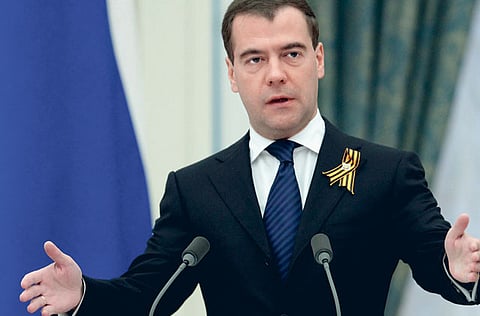Medvedev arrives in Syria on Monday for crucial visit
Damascus may look to send a strong message to Washington

Damascus: In an unprecedented visit by a Russian leader, President Dmitri Medvedev visits Syria tomorrow as observers say that this could be a way to pressure US and Israel for failure to advance peace talks.
Another possible aim would be to convince Russia to use its influence at the UN to drown upcoming sanctions on Iran — which are being currently debated — or to apply pressure to terminate a UN resolution calling for disarmament of non-state players in Lebanon.
Syria could also be sending a defiant message to Washington in light of the arising tension from the alleged Scud missile transfer to Lebanon, which Damascus firmly denies.
Although former President Hafez Al Assad, a staunch ally of the Russians, refused to sign a friendship agreement with the USSR throughout the first 10 years of his presidency, he relied on Soviet experts to train and arm the Syrian Army, build roads, bridges and the famous Euphrates Dam. Relations became less warm after the collapse of the Soviet Union in 1991, but were jump-started by Bashar Al Assad after he came to power in 2000.
Current projects
Additionally, a Russian company is currently working on two gas factories in the Syrian midland, with a production capacity of 10 billion cubic metres of gas per day, while a Russian oil company is undergoing excavation works in the Abu Kamal region.
More pressing, the Syrians are sending a strong message to Washington that the tension arising from the alleged Scud missiles transfer to Lebanon, which Damascus firmly denies, will not tarnish Syria's image or isolate it in the international community.



